National
Politicians, who rose through protests, loathe citizens on streets
Detaining Banke justice seekers from Maitighar for agitation shows Deuba government’s double standards, observers say.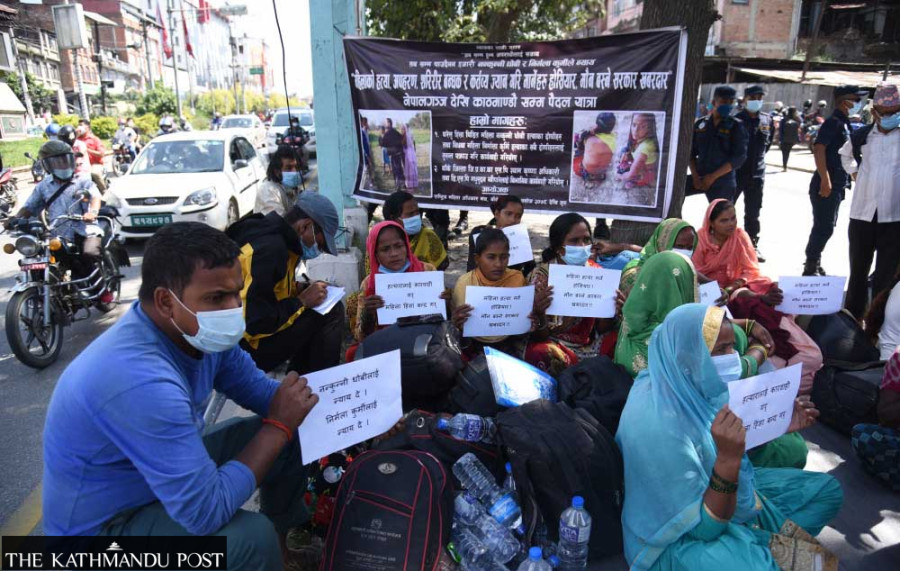
Binod Ghimire
Restricting protests at Maitighar Mandala was one of the first controversial decisions of the erstwhile KP Sharma Oli government. The ban drew widespread criticism.
The civil society along with the then opposition political parties including the Nepali Congress had condemned the ban imposed in April 2018. They said the ban was against democratic norms and against people’s right to demonstrate peacefully.
The C0ngress citing examples of democratic countries, had vowed to fight the ban. “We will defy the ban in appropriate time. People are free to demonstrate in front of the White House in America, they demonstrate right under government noses in Switzerland and Japan. I would like to remind the government that has restricted demonstrations near Singha Durbar in Maitighar Mandala that Nepal is not North Korea. There’s mala fide intention behind the restrictions!!” Nepali Congress spokesman Bishwa Prakash Sharma wrote on Twitter on June 28.
However, three years later Nepali Congress President Sher Bahadur Deuba’s government on Friday evening arrested 13 persons who were staging a sit-in at Maitighar demanding justice for two women. They had walked for 20 days covering over 500 kilometers all the way from Nepalgunj to Kathmandu to draw the attention of the federal government for a fair investigation into the death of Nakunni Dhobi and disappearance of Nirmala Kurmi, following the indifference of the local administration.
“The police arrested 13 among us while we were having dinner,” Sakina Teli, one of the demonstrators, told the Post. “While others were released within a couple of hours, Ruby didi (Ruby Khan who is leading the protest) hasn’t been released.” On Wednesday, 14 people, including 11 women, arrived at the Capital on foot and two others joined them the next day.
As the federal government too paid no attention to their demands, they started a sit-in at Maitighar on Friday. “They had informed the District Administration Office, Kathmandu about their protest. The act of arrest without even allowing them to eat properly is condemnable,” Mohna Ansari, a former member of the National Human Rights Commission, told the Post. “It is a fundamental right of an individual to protest peacefully. It is unfortunate that the parties that have risen to power through street protests are intolerant when people take to the streets to pressurise their governments.”
Not long back, the five-party alliance and their sister wings resorted to a series of demonstrations against the Oli government’s dissolutions of the House of Representatives.
Maitighar Mandala has always been a hotspot for demonstrations as it is close to Singha Durbar, the country’s federal administrative hub. In its ruling in response to a writ petition challenging the Oli government’s restriction, the Supreme Court had directed the government not to impose such restrictions.
But police defended Friday evening’s detentions. “Maitighar is not a place to spend the night. You have to stay in a hotel or somewhere else,” Superintendent of Police Ramesh Basnet, spokesperson at Metropolitan Police Range, Kathmandu, told the Post, explaining the reason behind the arrest. “We, however, released them shortly.”
Minister for Home Affairs Bal Krishna Khand told the Post on Saturday morning that he will find out what happened with the protesters. The Ministry invited the protesters for a dialogue in the afternoon. However, instead of agreeing to address their demands, the ministry asked them to return to Nepalgunj. “We were told that our demands will be addressed locally. We are pressured to return to Nepalgunj,” Teli told the Post. “We wouldn’t have taken the burden to travel to Kathmandu if it was done locally. But there is no basis to believe the assurance of the government.”
The team of 14 headed for Kathmandu after the local authorities paid no attention to their pleas and protests for justice. Earlier they had staged a sit-in in front of the District Administration Office for 19 days from August 29.
Nakunni, 38, was found dead under suspicious circumstances at her home on July 20 in Ward 2 of Janaki Rural Municipality in Banke. Nirmala, 52, had gone missing in January 2010 from the same rural municipality. Her disappearance came just two years after her two teenage sons were murdered within a span of a week. Neighbours and villagers say Nirmala owned a great deal of property, making her disappearance and the murder of her two sons suspicious. But police never took the case of her disappearance seriously.
Sanjeev Uprety, a member of the Brihat Nagarik Andolan [civic movement], said the restriction on peaceful protest cannot be the characteristics of a democratic government. It is shameful that the government led by the party calling itself democratic is using force against the women whose only demand is justice for the victims. “The parties in government must not forget that power isn’t permanent and they need Maitighar when they are out of government,” said Uprety. “The way the government is intimidating these protestors shows it is a deliberate act to protect someone.”
The protestors say they won’t give up unless the government releases Khan unconditionally and ensures a fair investigation into the two cases. They say the police haven't shared with them the whereabouts of Khan, their leader.
The police, without telling her colleagues in the protests, took Khan to Nepalgunj. “She was flown to Nepalgunj as a case was registered against her there,” said Basnet, the spokesperson at Kathmandu Police Range.




 11.12°C Kathmandu
11.12°C Kathmandu

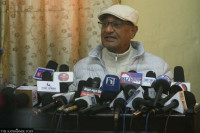
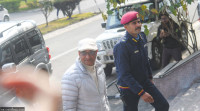





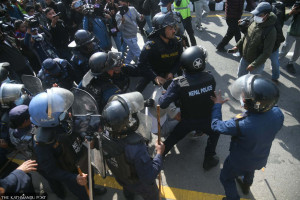
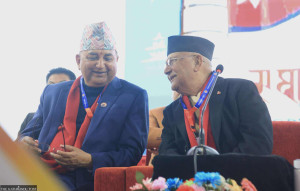



%20(1).jpg&w=300&height=200)

